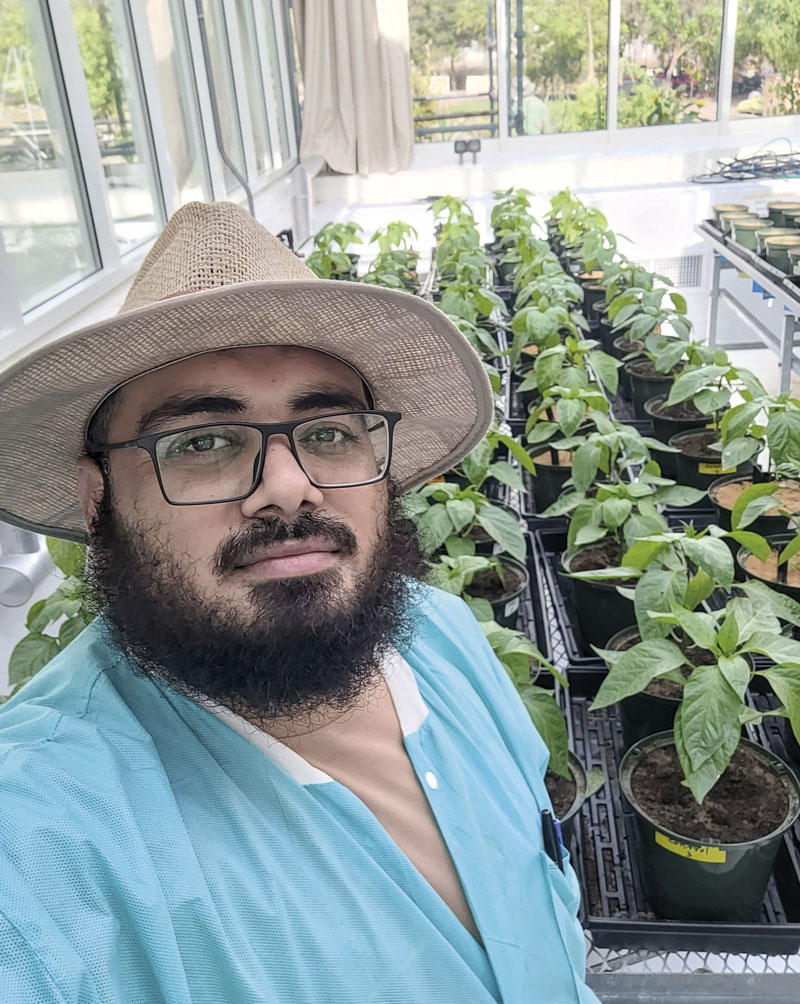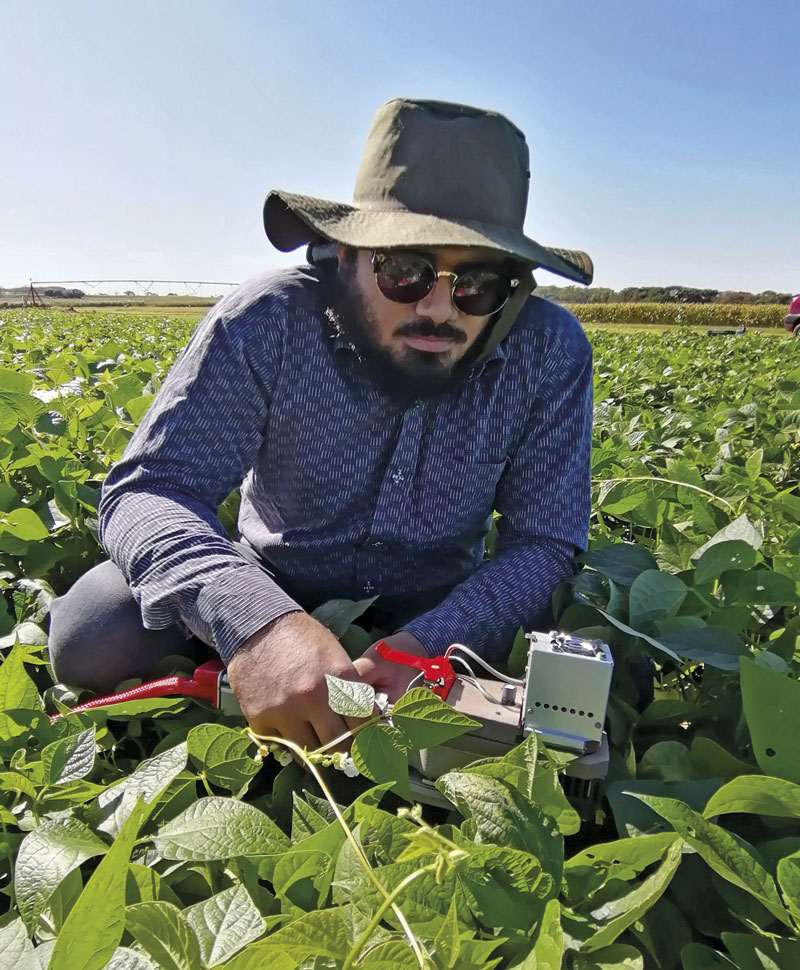
Personal archiveJalal in his laboratory at the King Abdullah University of Science and Technology, Saudi ArabiaPersonal archive
Since childhood, I have always been involved in the world of agriculture. My father is a farmer in the northern Pakistani town of Katlang. He grows grains, such as wheat and corn, and vegetables on his 4 hectares of land. I lived at the farm until I went to high school in Swabi, a city near my hometown, where I lived in a hostel.
In 2011, when I was 17, I enrolled at the University of Agriculture in Peshawar, which is in the same region. It is a large university, home to some of Pakistan’s best public colleges in the exact and biological sciences. Two of my uncles—my father’s brothers—studied there in the past.
While they were interested in investigating plant cultivation and diseases, I took a different path. In the first two years of my course, which were more general training, I went to the library a lot to read, including publications from the FAO [United Nations Food and Agriculture Organization]. I learned that in many parts of the world, especially in Africa, the soil is low in nutrients, and this compromises the nutritional quality of the food grown there. That’s how I became interested in the topic of food security.
In Pakistan, the final two years of your degree are when you specialize, and I chose agronomy. I wanted to find ways of improving agricultural productivity while at the same time increasing the amount of nutrients in grains. As soon as I graduated, I started a master’s degree at the same university.
Since then, I have been working on agronomic biofortification, a technique that uses a series of tools, such as mineral fertilizer, to make plants grown for human and animal consumption more nutritious. I really believe in this approach as a way to improve the diet and quality of life of the poorest people in the world. During my master’s degree, I did experiments using foliar fertilizer. I applied iron and zinc to the leaves of crops, and my research results were very promising.
After finishing my master’s degree, I applied for several grants to do a doctorate at an international institution. I was successful in three of them, including Nanjing Agricultural University in China, but I decided on Brazil.
One of the reasons I chose the Graduate Program in Agronomy at UNESP [São Paulo State University], Ilha Solteira campus, was the area of research of my future advisor, Marcelo Carvalho Minhoto Teixeira Filho. As another scholar of agronomic biofortification, he not only studies ways of enriching grains with iron and zinc, but also uses bacteria to increase the efficiency of nitrogen and phosphate fertilization. The use of bacteria in biofortification is new and I was curious to know more about this approach.

Personal archiveJalal with Marcelo Teixeira Filho, his PhD advisor at UNESPPersonal archive
I arrived in São Paulo in 2019. Adapting to Brazilian culture was, of course, a challenge. I am Muslim, like most Pakistani people. In my country, men do not greet women with kisses on the cheek and hugs—unless they are a family member, such as a mother, sister, or wife. For religious reasons, I do not drink any alcohol, nor do I eat pork or beef. I must confess that the food in Brazil was strange to me, but at the same time, there were things I loved: the fish, açaí, the fruit-flavored ice cream, as well as all the different natural fruit juices.
Professor Marcelo helped me a lot: he went house-hunting with me and he took me to restaurants. I soon realized that I needed to learn Portuguese quickly to be able to live independently. I made a deal with some UNESP colleagues: I would teach them English, and in return, they would teach me Portuguese. English is one of Pakistan’s official languages and I am fluent. Because of this, I helped write many articles for international publications.
At first, I felt very alone. In addition to the natural challenge of making friends in a new place, the world was plunged into the COVID-19 pandemic in 2020, shortly after I arrived. I had a long-distance wedding and my wife, Amna Gohar, arrived in Brazil in December that year. Due to the pandemic, only one plane per week was flying from Pakistan to Brazil. Sometimes, it was as little as one every two weeks. Amna came to study her own PhD in education at UNESP, Marília campus. Initially she studied remotely because of the pandemic, but later she began studying in person in Marília. Her goal is to evaluate the differences between pedagogy courses in Brazil and Pakistan.
Meanwhile, I received a joint grant from the CNPq [Brazilian National Council for Scientific and Technological Development] and TWAS [The World Academy of Sciences], which supports science in developing countries. I continued with my biofortification experiments on beans, maize, and wheat. However, on the advice of Professor Marcelo, I replaced foliar fertilization with the use of bacteria, which in this case are injected directly into the seed. The method reduces costs for farmers because it eliminates the need for spraying. Additionally, because the microorganisms enhance the plant’s ability to absorb nutrients, less mineral fertilizers are needed, reducing the impact on the environment.

Personal archiveJalal doing field research at UNESP in Ilha SolteiraPersonal archive
Various bacteria are used throughout the process. And we obtained positive results with beans, maize, and wheat. In all three cases, the zinc content in the grains increased by an average of 18% to 40%, with a peak of 48%. To top it off, the grains’ productivity increased by around 20%. We only tested zinc in the study, since the soil in the Ilha Solteira region is rich in iron and there is therefore no need to supplement this micronutrient.
My thesis based on this research was considered the best at the Ilha Solteira campus and won an award from the scientific journal Plants as one of the world’s three best doctoral agricultural sciences theses defended in 2022. Parts were even published in titles such as the Brazilian journal Revista Brasileira de Engenharia Agrícola e Ambiental, Germany’s Chemical and Biological Technologies in Agriculture, and Australia’s Crop and Pasture Science.
In June 2022, my son, Muhammad Ibrahim, was born in Ilha Solteira. I stayed in Brazil until May 2023, when I joined the King Abdullah University of Science and Technology in Saudi Arabia to do a postdoctoral fellowship that I will finish next year. I am still studying agronomic biofortification, but now I am investigating the production of a fertilizer capable of providing iron and zinc to plants through nanotechnology. My plan is to get a job at a university in Pakistan so that I can apply this knowledge in my country, where the soil is lacking in these two micronutrients. But I also want to maintain my ties with Brazil. This semester, I will return to the country with my wife, who will defend her doctoral thesis in Marília.
Republish